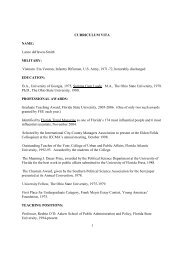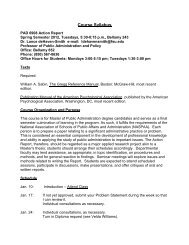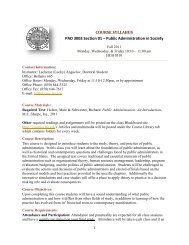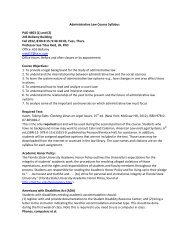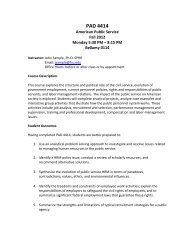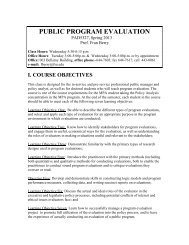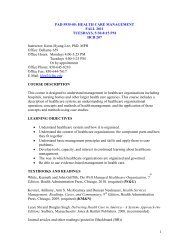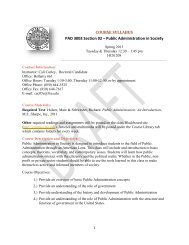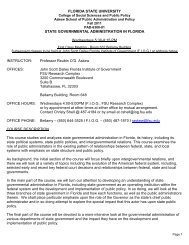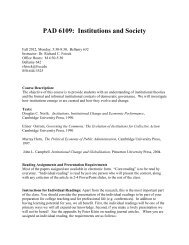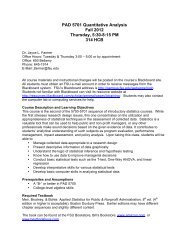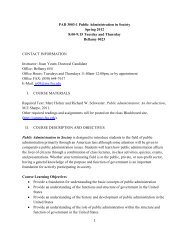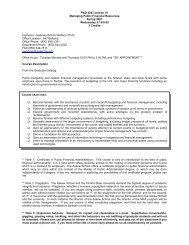PAD 5041 Course Description - Askew School of Public ...
PAD 5041 Course Description - Askew School of Public ...
PAD 5041 Course Description - Askew School of Public ...
You also want an ePaper? Increase the reach of your titles
YUMPU automatically turns print PDFs into web optimized ePapers that Google loves.
<strong>PAD</strong> <strong>5041</strong> <strong>Course</strong> <strong>Description</strong><br />
"<strong>Public</strong> service ethics" provides conceptual tools to clarify moral experiences,<br />
and analyzes individual decision making strategies and organizational<br />
programs. Unlike some classes, the emphasis is not only on issues <strong>of</strong> "how to,"<br />
but also on "why." As a result, the focus is on both the acquisition <strong>of</strong><br />
knowledge, as well as the appreciation <strong>of</strong> our ignorance and the expansion <strong>of</strong><br />
imagination. This course is not about right and wrong answers; it is about<br />
going beyond intuitive reactions to human behavior toward considered,<br />
analytical understanding.<br />
The week <strong>of</strong> August 27, students should ensure that they:<br />
-familiarize themselves with on-line courses by clicking on<br />
http://learningforlife.fsu.edu/online/index.cfm,<br />
Complete readings for Session One which commences September 4<br />
-submit the completed Readiness Quiz to the Drop Box (click on<br />
Student Tools) by Thursday, and<br />
-attend a one-hour reception will be held Friday at 5:30, DeVoe Moore<br />
Center, 150 Bellamy (those with unresolvable conflicts will have a<br />
telephone or <strong>of</strong>fice conference with the instructor); in addition,<br />
individual meetings will be scheduled with students early in the term.<br />
The initial class session begins Tuesday morning, September 4; each session<br />
thereafter runs Tuesday morning at 7:00 a.m. through Sunday, 6:00 p.m. The<br />
pr<strong>of</strong>essor is James S. Bowman (click on <strong>Course</strong> Homepage Instructor<br />
Information).<br />
Objectives<br />
Upon completion, the student will be able to:<br />
-appreciate why ethics is essential to leadership<br />
-understand and apply moral development theory at the individual and<br />
organizational levels <strong>of</strong> analysis<br />
-differentiate between ethical problems and ethical dilemmas, and<br />
design creative ways to deal with them<br />
-develop abilities to use moral imagination and ethical reasoning<br />
-employ an tripartite approach (the "ethics triangle") to address ethical<br />
issues<br />
-cultivate individual as well as organizational integrity<br />
-analyze the ethical dimensions <strong>of</strong> contemporary issues<br />
-create a plan to continue development <strong>of</strong> personal ethical capacity.<br />
Any student difficulties in achieving these goals are likely to result from a lack<br />
<strong>of</strong> study skills, time management, and self-discipline more than from a lack <strong>of</strong><br />
ability. That is, online learning places considerable demands to engage course<br />
material independently; this places the responsibility on the learner--exactly<br />
where it should be (!). This class, then, is a rigorous course in the finest sense<br />
<strong>of</strong> the word--one <strong>of</strong> the joys <strong>of</strong> intellect is using it, and you will do so in each<br />
weekly Session.<br />
Required Texts<br />
Johnson, C. (2012). Meeting the Ethical Challenges <strong>of</strong> Leadership. 4th edition.<br />
Thousand Oaks, CA: Sage.
West, J. and Berman, E., eds.(2006).The Ethics Edge. 2nd edition.<br />
Washington, DC: International City/County Management Association.<br />
Alford, C. (2001). Whistleblowers. Ithaca, NY: Cornell University Press.<br />
<strong>Course</strong> materials should be purchased immediately upon confirmation <strong>of</strong><br />
registration. Required texts can be obtained from a variety <strong>of</strong> online vendors<br />
such as Amazon http://www.amazon.com. Texts may also be accessed<br />
through many university libraries. Students who have not received their books<br />
at least five days before the term are encouraged to cancel their orders and<br />
place a rush order with another vendor. Do not attempt to commence the<br />
course without the books in hand.<br />
Communication Requirements<br />
While this class is indeed flexible in one sense, it is nonetheless quite<br />
demanding in another sense. It is a combination <strong>of</strong> individual study and<br />
engagement with others in a structured learning environment. Students will<br />
need to have reading assignments completed early each week in order to<br />
participate effectively in discussion. Accordingly, everyone is expected to<br />
balance their non-academic and academic obligations so as to maintain<br />
substantive, consistent, and timely course participation throughout the term. It<br />
is crucial that each class member be actively involved each week. This is not a<br />
self-paced course.<br />
To engage in discussion, click on the Groups key on the left side <strong>of</strong> the course<br />
home page, and then on "Discussion Board" for the group you are assigned<br />
to. Students are expected to initiate a minimum average <strong>of</strong> four independent,<br />
substantive contributions and at least two substantive responses to other<br />
students' contributions each week; there is no maximum on the number <strong>of</strong><br />
contributions. Weekly discussions are from early Tuesday morning through<br />
Sunday at 6:00p.m. . From Sunday evening through Monday, an<br />
optional Open Mike is available to anyone who wishes to discuss ethical issues<br />
not directly covered that week (for personal matters contact the instructor).<br />
Simply <strong>of</strong>fer your thread and await responses.<br />
To encourage coherence in the overall discussion participate at least:<br />
once by Tuesday (extra credit for morning posts),<br />
once by Wednesday<br />
once by Thursday,<br />
once by Friday, and<br />
twice by Saturday or Sunday.<br />
Participate frequently during the week in a pattern:<br />
- respond to the discussion thread,<br />
- comment on others' postings (include a salutation, "Dear Elvis,...),<br />
- read replies to your messages,<br />
- answer them indicating what has been gained from peer comments, and<br />
- as <strong>of</strong>ten as not posts should end by posing a question.<br />
Do not respond to all threads for the week at one time; instead permit the<br />
discussion <strong>of</strong> each one to get well underway before reacting to the next<br />
instructor thread.
The submissions must be a genuine contribution to the topic under study and<br />
reflect the quality <strong>of</strong> discourse characteristic <strong>of</strong> a seminar. Primary emphasis is<br />
on the quality <strong>of</strong> participation; it is important that comments build on previous<br />
remarks and make explicit reference to the readings so that learning is<br />
cumulative and theory directed.<br />
Commonly accepted norms <strong>of</strong> "netiquette" include:<br />
- indicating the purpose <strong>of</strong> the message and, for long messages, providing a<br />
brief overview statement identifying the main topics to be discussed<br />
- using paragraphs when writing messages (to make comments readily<br />
accessible, avoid excessively long paragraphs by dividing contributions into<br />
easily-read paragraphs <strong>of</strong> about three or four sentences each)<br />
- avoiding slang or abusive language (e.g., uppercase type is the equivalent <strong>of</strong><br />
shouting).<br />
Key is communication that includes:<br />
- open mindedness<br />
- regular monitoring, updating, and status reporting<br />
- prompt acknowledgment <strong>of</strong>, and substantive response to, messages<br />
- availability for telephone conversations.<br />
In a nutshell, task behavior (initiating, information seeking, clarifying,<br />
summarizing) and maintenance behavior (encouraging, harmonizing,<br />
compromising) should take precedence over self-serving behavior (blocking,<br />
deserting, aggressive criticism, boasting, "social loafing"). No one ever<br />
regretted doing his or her best.<br />
Empirical studies demonstrate that discussions are most effective when they<br />
are reader friendly (connections are made to previous messages and the new<br />
message has a clear objective) and contain positive attitudes (complete the<br />
work in an upbeat manner, as even one person with a negative attitude in an<br />
on-line environment can undermine trust).<br />
To summarize, you are committing yourself to at least 4-6 hours per week <strong>of</strong><br />
preparation for the Board and approximately 3 hours per week in contributions<br />
on the Board (it is prudent to schedule blocs <strong>of</strong> time in advance for<br />
participation). Since this is roughly the equivalent <strong>of</strong> preparing for and attending<br />
an on-campus undergraduate course, do not be surprised if the time involved<br />
goes beyond this minimal estimate for this class. Because it depends upon<br />
lively discussions from week to week, students unable to participate on a<br />
regular basis are expected to drop the course early in the term.<br />
<strong>Course</strong> Assignments & Performance Expectations<br />
Ethics is based on the actions <strong>of</strong> people. Accordingly, it cannot be achieved<br />
unless all in the organization practice it at a personal level; such a commitment<br />
is both a privilege and an obligation. Success ultimately depends upon what we<br />
know, what we do, and what we become as a result. As Aristotle saw, we<br />
cannot expect to attain excellence without studying and mastering the art <strong>of</strong><br />
achievement. As a manager or future manager, you cannot delegate that<br />
responsibility: you must show the way by example.<br />
Accordingly, ethical management is not only an academic subject to be<br />
studied, but also a way to improve your own activities. Personal effectiveness<br />
can be enhanced by activities such as:<br />
-keeping up with the readings,
-responding promptly to classmates,<br />
-meeting and exceeding assignment standards, and<br />
-devoting sufficient effort to ensure success.<br />
In short, ethics as practiced by the individual is the foundation upon which class<br />
quality is built. That is, anything worth doing is worth doing well.<br />
Note that neither the mere completion <strong>of</strong> various requirements nor the time<br />
spent on them determines the granting <strong>of</strong> credit. Simple familiarity with the<br />
material is not to be mistaken for either understanding or mastery.<br />
The following assignments will determine the final grade by the percentage<br />
indicated:<br />
-Class Participation and Personal Checklist/Journal Assignment: 20%<br />
-Midterm Examination: 25%<br />
-Term Paper: 30%<br />
-Final Examination: 25%<br />
Note: Completion <strong>of</strong> the checklist/journal assignment provides a rich source <strong>of</strong><br />
material for Board discussions and examinations; indeed, satisfactory<br />
completion <strong>of</strong> those dimensions <strong>of</strong> the course depends to a considerable<br />
extent upon that assignment.<br />
- Extra Credit: discretionary weighting for student benefit for Tuesday<br />
morning Board Participation, Enrichment Exercises, and other opportunities<br />
available throughout the course. Be advised that it is important to fully<br />
complete required assignments rather than to devote time to extra assignments<br />
at their expense.<br />
1. Class Participation and Personal Checklist/Journal (see Session One<br />
assignment and "Communication Requirements" section above). Unless<br />
otherwise indicated, one- to four-paragraph answers to questions posed at the<br />
end <strong>of</strong> each session should be drafted in preparation for class discussion. For<br />
both the board discussions and the personal checklist/journal assignments (as<br />
well as other written work), heed William Faulkner's view that "I never know<br />
what I think about something until I have read what I've written about it." The<br />
checklist/journal, as a personal individualized assignment, is completed on the<br />
"honor system" for one's self reflection and learning; it is not submitted to the<br />
instructor except for possible extra credit.<br />
2. Work-Related Case Study Term Paper. Building on your journal or other<br />
experiences, identify an ethically challenging situation (one with no clear right<br />
or wrong solution) directly from your work as an employee (or student).<br />
The paper should be a management case you are personally familiar with at<br />
work (or school), not a broad public policy issue (e.g., a dilemma faced in your<br />
work at a blood supply agency would be appropriate, but a general discussion<br />
on blood quality policy would not). This assignment, then, is a problem-solving<br />
exercise in self-discovery; students must have intimate, first-hand knowledge <strong>of</strong><br />
the case circumstances.<br />
The management issue selected may have important policy implications, but<br />
the objective is to analyze ways to deal with the situation utilizing the "ethics<br />
triangle" (re: Session Nine). Employ interview data, organizational documents,<br />
pr<strong>of</strong>essional literature, and academic sources to substantiate the analysis.
A descriptive paper discussing a broad subject area and/or a variety <strong>of</strong> issues,<br />
typical <strong>of</strong> an undergraduate term paper, does not fulfill the requirement.<br />
Likewise, an essay that emphasizes topics unique to the private sector with no<br />
implications for non-pr<strong>of</strong>it or governmental agencies is also inappropriate. A<br />
situation involving interpersonal or family matters, as opposed to a public<br />
management issues, also does not meet the goal <strong>of</strong> the assignment.<br />
The thoroughly documented study should: (a) succinctly define the situation in<br />
the case (1p.), (b) briefly examine the background <strong>of</strong> the case (2pp.), (c)<br />
emphasize the use <strong>of</strong> the ethics triangle (Session Nine) to analyze the dilemma<br />
(most <strong>of</strong> the paper), and (d) make a recommendation (1-2pp.). Steps to<br />
completion are:<br />
a one-paragraph statement (that includes a working title and subtitle, a<br />
purpose sentence (similar to c. just above), and a short specification <strong>of</strong><br />
the case ("avoid extra work by doing it right the first time"; ensure that<br />
it is a difficult situation with no easy answer) is due during Session<br />
Five-Six,<br />
an outline <strong>of</strong> the paper, including a working bibliography (include<br />
citations to organizational documents and a separate list <strong>of</strong> potential<br />
interviewees) and using the attached form<br />
in Session Nine Assignment section, is due at the end <strong>of</strong> that Session,<br />
and<br />
the final 14-15 page, double-spaced paper (plus outline with the<br />
instructor's outline comments and completed assignment checklist<br />
found in an attachment to Session 13) is due at the end <strong>of</strong> that<br />
Session. Ensure that your name appears on the attachments, and that<br />
the paper is paginated; do not include a table <strong>of</strong> contents or abstract.<br />
For all submissions, if feedback is not received within 48 hours, then assume a<br />
transmission problem and resend the message. Note that preliminary work is<br />
evaluated, but not graded.<br />
Late papers, or those without the items specified above, lose one letter grade.<br />
The final submission should include the instructor's comments on the initial<br />
outline with the paper; it is not necessary to submit a copy <strong>of</strong> the revised<br />
outline. Click on <strong>Course</strong> Materials on the Homepage for information on Word<br />
Grammar Function.<br />
3. Midterm and Final Examinations. These "open book" tests (Sessions 7<br />
and 14 respectively) consist <strong>of</strong> approximately three or four long-essay<br />
questions (e.g., each answer, unless otherwise indicated, should be about 7-8<br />
paragraphs; there may be several short essays as well). They will be<br />
weighted 40 percent on class discussions, 60 percent on readings (note,<br />
however, that most discussions are based on the readings).<br />
Each answer must be: (a) coherent (contain an introduction, text, and<br />
conclusion), (b) documented (make specific references to course information),<br />
and (c) critical (do not merely repeat and describe the material). Examples <strong>of</strong><br />
examination topic areas include pr<strong>of</strong>essionalism, individual decisionmaking<br />
approaches, organizational ethics strategies, and a personal ethical capacity<br />
plan (re: Johnson, chapter two).<br />
These tests are an effective learning device--provided that all readings are<br />
completed prior to the examination; if this is not possible, then please do not<br />
take the course. It is not feasible (nor desirable) to attempt to complete the
examinations without proper preparation (i.e., most items are integrative,<br />
"thought" questions; they cannot be "looked up and copied down").<br />
The tests, stated differently, reflect the type <strong>of</strong> challenges faced by<br />
pr<strong>of</strong>essionals: those that require the synthesis and application <strong>of</strong> knowledge<br />
and skills to challenging situations. Approximately five days will be available to<br />
complete each examination.<br />
4. Enrichment Exercises. There are a number enrichment, "extra-credit"<br />
activities in the discussion threads (as well as short assignments) and earlyweek<br />
Board participation opportunities. Successful completion will increase<br />
one's grade by one-half a letter grade.<br />
In summary, examine each Session's folder in <strong>Course</strong> Documents for<br />
discussion assignments as well as for details on the assignments shown below.<br />
Each <strong>of</strong> the items shown should be emailed to the instructor; they are due no<br />
later than 11:59 p.m., Pacific Time, on the dates indicated.<br />
Session 5: Term Paper Initial Statement Sunday, October 7<br />
Session 7: Midterm Examination Friday, October 19<br />
Session 9: Term Paper outline (use template as directed) Sunday, Nov. 4.<br />
Session 13: Term Paper (include ancillaries as directed) Sunday. Dec. 9<br />
Session 14: Finish Final Examination Friday, December 14.<br />
Feedback Policy: Every effort will be made to respond to student work within 48<br />
hours. Be sure to check Announcements for any special circumstances<br />
affecting this policy. Do not hesitate to contact the instructor as needed.<br />
The philosophy underlying this evaluation system is "excellence as merit"--i.e.,<br />
everyone competes against quality standards (that is, everyone can win, like in<br />
an orchestra). The alternative is "excellence as superiority"--i.e., people<br />
compete against one another (that is, few win and many lose, like in most<br />
sports competitions) is not used in this class.<br />
Grading, Academic Honesty, Accessibility and <strong>Course</strong> Evaluation<br />
Policies<br />
Grading Policy: see above; also, consult FSU website.<br />
Academic Honesty, Accessibility and <strong>Course</strong> Evaluation Policies: click on<br />
<strong>Course</strong> Materials.<br />
Consult the FSU Honor Code found in the <strong>Course</strong> Library, near the bottom <strong>of</strong><br />
the list.<br />
Procedures for Work Submission, Absences, and Late Policy<br />
Submission. Each assignment in the <strong>Course</strong> Documents folders describes<br />
how to submit work.<br />
Absences. Students are expected to schedule their personal and pr<strong>of</strong>essional<br />
obligations so as to maintain continuous participation in the course. Rare<br />
circumstances, however, may present difficulties. For a pre-planned absence<br />
(which should be kept to a minimum), make arrangements in advance for
Discussion Board participation and submission <strong>of</strong> assignments. For an<br />
emergency absence (severe health or weather problems), notify the instructor<br />
as soon as possible to make appropriate arrangements. Also see "Class<br />
Participation and Persronal Checklist/Journal" section above.<br />
Late Work. In general, "plan your work, work your plan" so as to fulfill course<br />
obligations. Late work cannot be accepted for Discussion Board and<br />
Enrichment assignments. Deadline extensions for examinations or the term<br />
paper will not be considered except for highly unusual, documented<br />
circumstances provided prior to due dates.<br />
If an assignment is submitted late, and no prior arrangement has been made,<br />
then it will lose one letter grade. Assignments over two days late cannot be<br />
accepted without consultation and documentation.<br />
Incompletes are given at the discretion <strong>of</strong> the instructor. If granted, students<br />
should have successfully completed most <strong>of</strong> the course and should then<br />
contact the instructor before the last week <strong>of</strong> the class with documentation in<br />
hand. They are to be prepared to take responsibility to fulfill the remaining<br />
assignments, as determined by the instructor, in a timely manner.<br />
Every effort will be made to be fair and equitable to all concerned; no one will<br />
be provided with an advantage over other students as a result <strong>of</strong> the above<br />
policies.



